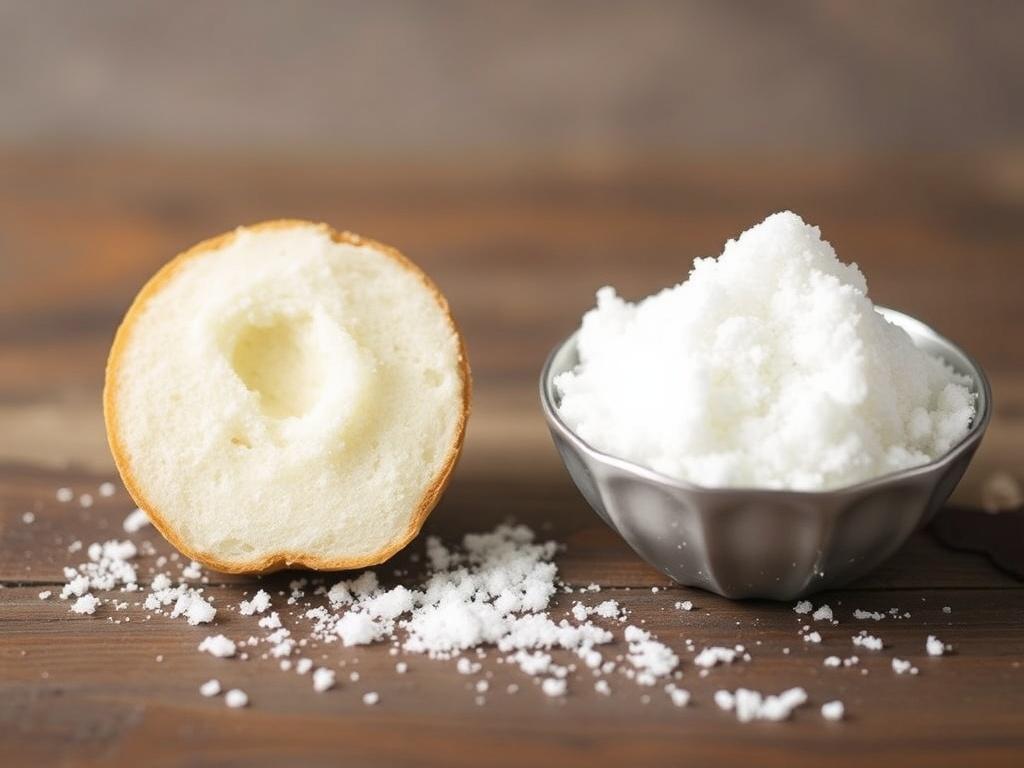Содержание статьи
- 1 Understanding Sugar: More Than Just Sweetness
- 2 The Science Behind Sugar and Premature Aging
- 3 Sugar’s Impact Beyond the Skin
- 4 Recognizing Sugar in Your Diet
- 5 The Role of Inflammation in Sugar-Induced Aging
- 6 Strategies to Reduce Sugar Intake and Support Youthful Skin
- 7 Can Sugar Be Part of a Healthy Aging Plan?
- 8 Popular Myths About Sugar and Aging Debunked
- 9 Looking Ahead: Research and Emerging Insights
- 10 Final Thoughts on Sugar and Premature Aging
Sugar is everywhere—in the desserts we love, the drinks we reach for when we’re thirsty, and even in so-called “healthy” snacks that sneakily contain added sweeteners. It’s no secret that too much sugar isn’t great for our health, but did you know it could be one of the key culprits behind premature aging? From wrinkles to chronic inflammation and beyond, sugar has a surprising number of ways it can speed up the aging process. In this article, we’ll explore the fascinating science connecting sugar and premature aging, how sugar affects your skin and body, and what you can do to protect yourself without giving up all your favorite treats.
Understanding Sugar: More Than Just Sweetness
When we talk about sugar and aging, it helps to first understand exactly what sugar is. Sugar is a type of carbohydrate that provides energy to the body. There are many kinds of sugar—glucose, fructose, sucrose—each with slightly different effects on the body. The sugar that’s most often linked with premature aging is refined sugar, which is added to many processed foods and beverages. Unlike natural sugars found in fruits and vegetables, refined sugars can spike your blood sugar levels quickly and cause harmful reactions in the body.
One of the major issues is that excessive sugar consumption leads to a process called glycation. This is where sugar molecules attach themselves to proteins and fats in your body, creating harmful compounds known as advanced glycation end products, or AGEs. These AGEs can damage your collagen and elastin, the proteins responsible for keeping your skin firm and youthful.
The Science Behind Sugar and Premature Aging
So, what does glycation really mean for your skin and overall health? When AGEs form, they cause your skin’s structural proteins to become stiff and malformed. Imagine these proteins as the scaffolding that holds up a building. If that scaffolding becomes brittle, the building starts to sag. On your face, this results in wrinkles, sagging skin, and loss of elasticity.
But the impact of sugar goes deeper. AGEs also promote inflammation, a silent factor behind many chronic diseases and aging signs. Inflammation triggered by sugar can accelerate skin dullness and exacerbate conditions like acne and rosacea, making your skin appear older than it really is.
How Sugar Harms Collagen and Elastin
Collagen and elastin are vital to maintaining a youthful appearance. Collagen acts like a glue keeping your skin intact, while elastin allows it to stretch and bounce back. AGEs formed from sugar intake cross-link these proteins, reducing their flexibility and strength.
| Protein | Function in the Skin | Effect of Sugar-Induced Glycation |
|---|---|---|
| Collagen | Provides skin strength and structure | Becomes brittle and less abundant, leading to wrinkles |
| Elastin | Allows skin elasticity and bounce | Loses elasticity, causing sagging and loss of firmness |
The breakdown of these essential proteins means that sugar doesn’t just make you gain weight or affect your teeth—it’s directly undermining your skin’s youthful appearance.
Sugar’s Impact Beyond the Skin
While the link between sugar and premature aging is most visible in the skin, the damaging effects of excessive sugar consumption spread throughout the body. High sugar intake has been linked to inflammation, oxidative stress, and insulin resistance—all factors that contribute to cellular aging.
When your blood sugar spikes, your body produces more insulin to regulate it. Over time, this constant demand can lead to insulin resistance, a state where your cells become less responsive to insulin. This condition is associated with type 2 diabetes, but it also accelerates aging by impairing cellular repair and regeneration mechanisms.
Additionally, sugar can harm your mitochondria—the powerhouses of your cells. Damaged mitochondria mean less energy production and more free radicals, which can damage DNA and contribute to the aging process at the cellular level.
Other Health Consequences of Excess Sugar
Here’s how a high-sugar diet can affect different parts of your body, accelerating aging in diverse ways:
- Brain: Increased risk of cognitive decline and memory problems.
- Heart: Higher risk of cardiovascular diseases due to inflammation and plaque buildup.
- Liver: Elevated chance of fatty liver disease, impairing detoxification.
- Immune System: Suppression of immune response, making you more prone to infections.
Recognizing Sugar in Your Diet

Pinpointing how much sugar you consume is trickier than it sounds. Sugar hides under many names—high-fructose corn syrup, corn syrup solids, fruit juice concentrates, maltose, dextrose, and more. The average person in many western countries consumes far more sugar than recommended, often without realizing it.
The American Heart Association recommends no more than 25 grams (about 6 teaspoons) of added sugar per day for women and 36 grams (9 teaspoons) for men. Yet, a typical soda alone can contain up to 40 grams of sugar! Identifying added sugars on nutrition labels is essential in managing your intake.
Common Foods High in Added Sugars
| Food/Beverage | Typical Sugar Content | Note |
|---|---|---|
| Soda (12 oz) | ~39 grams | Often exceeds daily recommended sugar intake |
| Cereal (1 cup sweetened) | ~10-20 grams | Can be surprisingly high in sugar |
| Yogurt (flavored, 6 oz) | ~15-25 grams | Flavored varieties add extra sugar |
| Fruit Juices (8 oz) | ~20-30 grams | Contains natural and added sugars |
| Energy Bars | ~12-30 grams | Check label for added sugars |
The Role of Inflammation in Sugar-Induced Aging

Inflammation is often called the “silent killer” because it contributes to many chronic diseases and accelerates aging quietly over time. Sugar fuels inflammation by increasing the production of pro-inflammatory molecules in the body.
High sugar consumption can cause your immune cells to release more cytokines, which are signaling molecules that promote inflammation. Chronic inflammation damages tissues and impairs the body’s ability to repair itself, leading to accelerated breakdown of skin, joints, and organs.
Signs That Sugar May Be Fueling Inflammation in Your Body
- Persistent skin issues like redness, acne, or rosacea
- Frequent digestive upset or bloating
- Joint pain or stiffness without injury
- Fatigue or brain fog after meals
- Unexplained weight gain, especially around the abdomen
If you notice these symptoms, it might be time to examine your sugar consumption and make some changes.
Strategies to Reduce Sugar Intake and Support Youthful Skin
Cutting back on sugar doesn’t mean you have to abandon your sweet tooth completely. With a few smart strategies, you can enjoy tasty foods while protecting your body from premature aging.
- Read Labels: Look for hidden sugars under different names and choose products with little or no added sugar.
- Choose Whole Foods: Focus on fresh fruits, vegetables, whole grains, and lean proteins instead of processed snacks.
- Substitute Naturally Sweet Ingredients: Use spices like cinnamon or vanilla to add sweetness without added sugar.
- Hydrate with Water: Swap sugary drinks for water, herbal teas, or sparkling water infused with fruits.
- Limit Dessert Frequency: Enjoy sweets as an occasional treat rather than a daily habit.
- Maintain Balanced Meals: Eating protein and fiber-rich foods can help keep blood sugar stable and reduce sugar cravings.
Foods That Help Combat Sugar’s Aging Effects
Certain nutrients can help protect your skin and body from the damage caused by sugar and glycation:
| Food/Nutrient | Benefits |
|---|---|
| Vitamin C (citrus fruits, bell peppers) | Boosts collagen production and antioxidant defense |
| Antioxidant-rich berries (blueberries, strawberries) | Reduce inflammation and oxidative stress |
| Leafy Greens (spinach, kale) | Provide vitamins and minerals supporting skin repair |
| Green Tea | Contains polyphenols that inhibit glycation |
| Nuts and Seeds (almonds, flaxseeds) | Supply healthy fats that help skin hydration and elasticity |
Can Sugar Be Part of a Healthy Aging Plan?
It’s important not to demonize sugar entirely. Our bodies need carbohydrates for energy, and rarely does enjoying a piece of chocolate cake or a sweet beverage cause harm when done in moderation. The key is balance and awareness.
Instead of obsessing over every gram of sugar, consider the overall quality of your diet and lifestyle. Regular exercise, stress management, and good sleep are equally important for healthy aging. When combined with controlled sugar intake, these habits create a strong foundation to keep both your skin and body youthful.
Practical Tips for Mindful Sugar Consumption
- Ask yourself why you want sugar—are you hungry, thirsty, or bored?
- Opt for smaller portions of sweets and savor every bite slowly.
- Prepare homemade treats using natural sweeteners like honey or maple syrup in moderation.
- Pair sweet foods with protein or fat to slow sugar absorption and prevent spikes.
- Find other activities to reward yourself or reduce stress, instead of turning to sugar.
Popular Myths About Sugar and Aging Debunked

Because the connection between sugar and premature aging has become increasingly discussed, misinformation flies fast. Let’s clarify some common myths:
- Myth: Eating sugar causes immediate wrinkles.
Fact: Skin aging due to sugar is a gradual process related to glycation over time, not instant. - Myth: All sugars are equally bad.
Fact: Natural sugars in fruits come with fiber and nutrients that mitigate negative effects. - Myth: Cutting out sugar means quitting all carbs.
Fact: Complex carbohydrates are crucial for energy and don’t cause the same aging issues. - Myth: Only sugary foods cause premature aging.
Fact: Other lifestyle factors like smoking and sun exposure also play significant roles.
Looking Ahead: Research and Emerging Insights
The science around sugar and aging is still evolving. Researchers are investigating how different types of sugars affect glycation and the development of new therapies that might block or reverse AGE formation.
Innovations in skincare are also exploring ingredients that can counteract glycation damage, such as carnosine and certain plant extracts. However, no topical product can replace a balanced diet and healthy lifestyle.
Final Thoughts on Sugar and Premature Aging
Conclusion: The link between sugar and premature aging is clear: excessive sugar consumption accelerates the body’s natural aging processes through glycation, inflammation, and oxidative stress. Although sugar is a common and enjoyable part of many diets, its impact on skin and overall cellular health can be profound. To maintain a youthful appearance and support longevity, it’s essential to manage sugar intake mindfully, favor whole and nutrient-rich foods, and adopt healthy lifestyle habits. By understanding sugar’s role in aging, you gain the power to make choices that protect your health and beauty, preserving your vitality for years to come.

